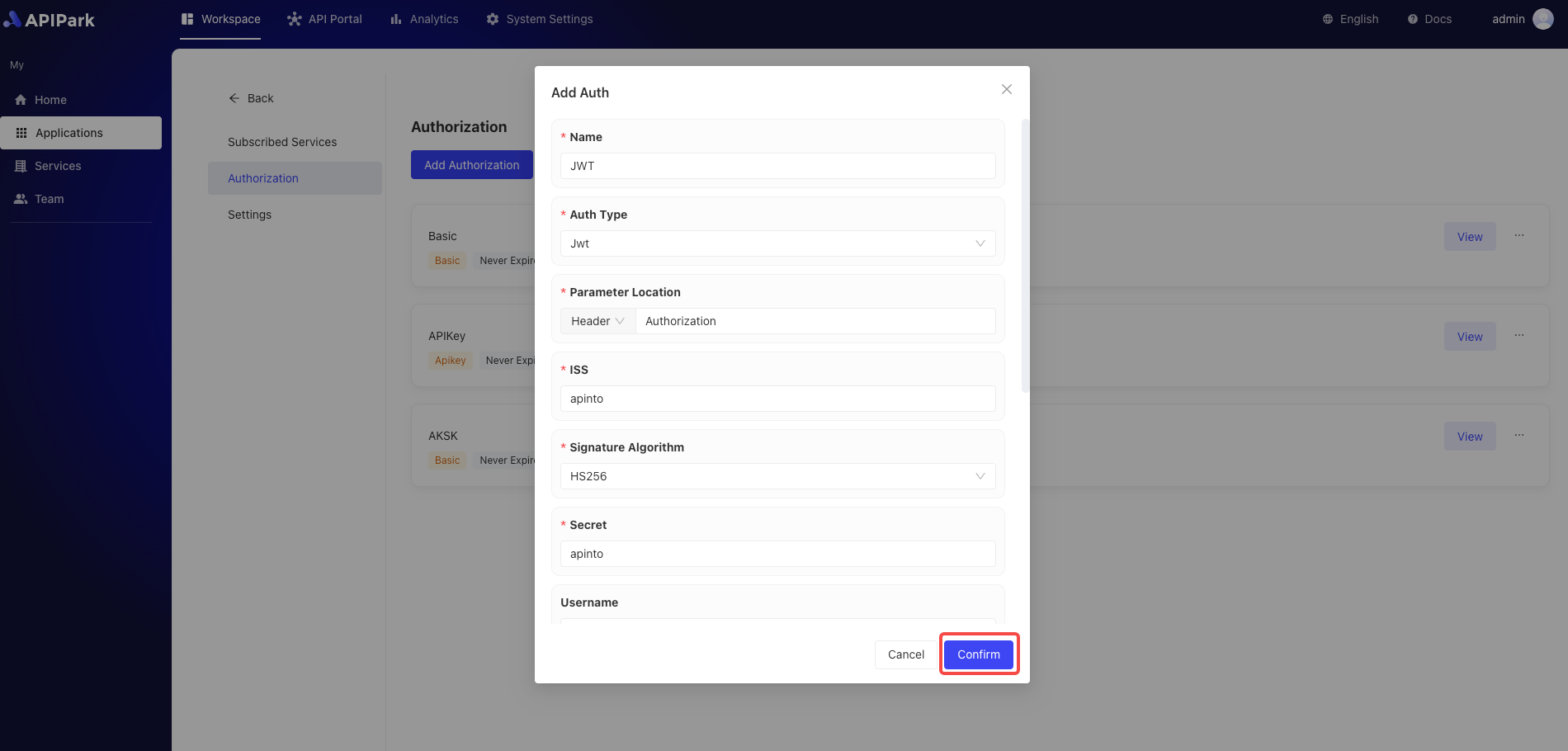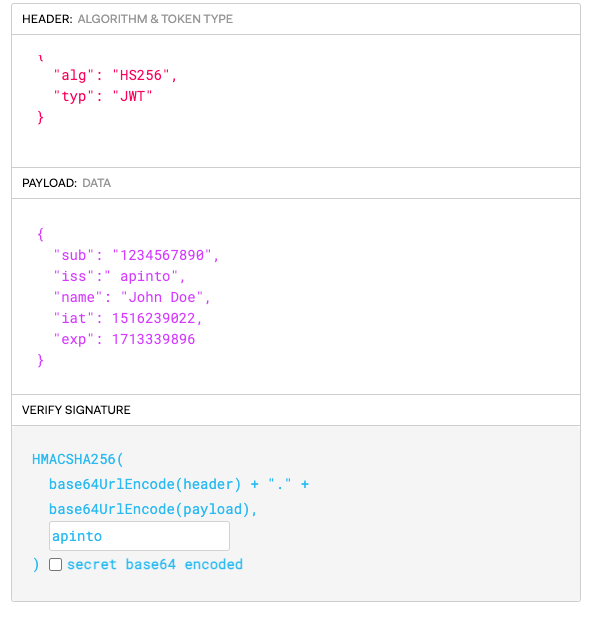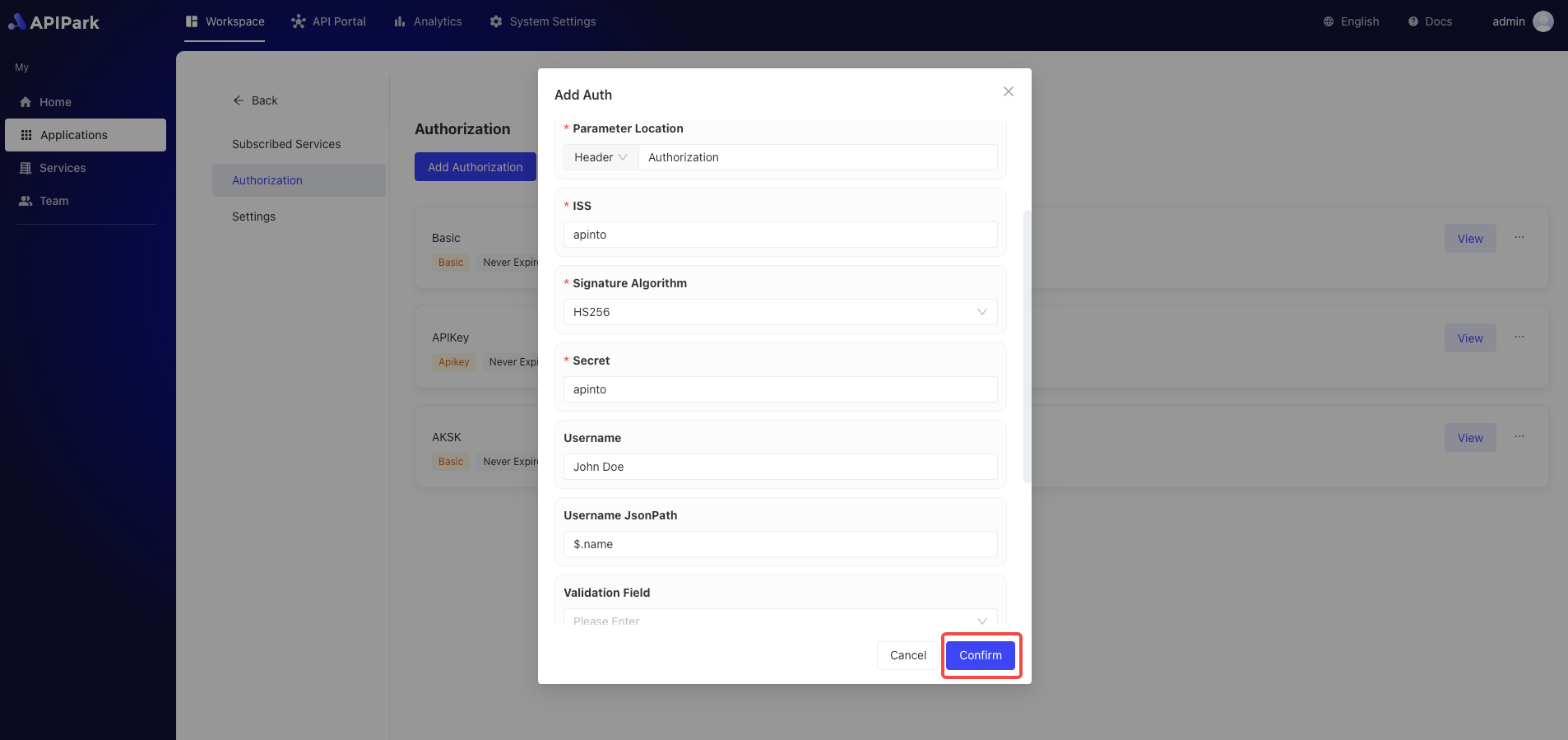JWT
The API Open Platform provides a JWT (JSON Web Token) authentication mechanism designed to offer secure and efficient identity verification and access control for API calls.
What is JWT Authentication?
JWT authentication is a method of identity verification based on JSON Web Tokens. A JWT is a compact, URL-safe token format used to securely transmit information between different systems. It contains authentication and authorization information and is digitally signed to ensure its integrity and authenticity.
- JWT Structure:
- Header: Declares the type and signature algorithm.
- Payload: Contains user identity and authorization information.
- Signature: Used to verify the token's authenticity and integrity.
Core Functions
-
Token Generation and Issuance:
- The server generates a JWT after the user passes authentication, containing the user's identity and permissions.
- The JWT is signed using a pre-shared key or private key to ensure the token's authenticity and prevent tampering.
-
Token Transmission and Storage:
- The client carries the JWT for authentication in subsequent requests, typically in the HTTP header (usually the Authorization header).
- JWTs can be stored in the client's local storage, session storage, or cookies to facilitate cross-request carrying.
-
Token Verification and Parsing:
- Upon receiving a request, the server uses the shared key or public key to verify the JWT's signature.
- Once verified, the token is parsed to obtain the user's identity and permissions for appropriate authorization actions.
-
Token Refresh and Invalidation:
- Supports short-lived JWTs and a refresh token mechanism to ensure the security and timely invalidation of tokens.
- Users can obtain a new JWT through the refresh token mechanism to extend the login session without re-authentication.
Advantages
-
Stateless and Distributed Support:
- JWT authentication is stateless, and servers do not need to store session information, making it suitable for distributed systems and microservice architectures.
- Clients carry complete identity information with each request, facilitating cross-system and cross-service identity verification.
-
Efficiency and Flexibility:
- The JWT format is compact, ensuring efficient transmission and parsing, suitable for use on mobile devices and in bandwidth-constrained environments.
- Supports custom payload fields for flexibly transmitting user identity and permissions, meeting diverse business needs.
-
Security:
- Uses digital signatures to ensure the token's authenticity and integrity, preventing tampering and forgery.
- Supports various signing algorithms (e.g., HMAC, RSA) to select the appropriate algorithm based on security needs.
-
Standardization and Broad Support:
- JWT is an open standard (RFC 7519), widely applied and supported in the industry, with an abundance of development libraries and tools.
- Compatible with a variety of programming languages and frameworks, making it easy to integrate and implement.
Demo
- When configuring authentication, select
Jwtas the type and fill in the authentication information:

| Field Name | Description |
|---|---|
| Parameter Position | The position in the request for authentication validation, supports Header, Query, Body |
| Parameter Name | Name of the parameter |
| Iss | Issuer |
| Signature Algorithm | Supports HS256, HS384, HS512, ES256, ES384, ES512, RS256, RS384, RS512 |
| Secret | Key, effective only for HS256, HS384, HS512 signing algorithms |
| RSA Public Key | RSA public key, applicable only for ES256, ES384, ES512, RS256, RS384, RS512 algorithms |
| Username | Username |
| Username JsonPath | The path of the user field in the payload, format reference json path |
| Validation Fields | Supports the selection of exp, nbf |
| Base64 Encoding | Whether to Base64 encode the signature, only valid for HS256, HS384, HS512 |
| Hide Authentication Information | Whether to hide user information when forwarding to upstream services |
For quick JWT construction, refer to the JWT generator tool
JWT Authentication Example
Authentication Information
Header
{
"alg": "HS256",
"typ": "JWT"
}
Payload
{
"sub": "1234567890",
"iss": "apinto",
"name": "John Doe",
"iat": 1516239022,
"exp": 1713339896
}
In which the username is John Doe, the expiration time is 1713339896, i.e., 2024-04-17 15:44:56, and the issuing authority is apinto
Set Secret to apinto, as shown below

Token
Generate the token based on the above configuration
eyJhbGciOiJIUzI1NiIsInR5cCI6IkpXVCJ9.eyJzdWIiOiIxMjM0NTY3ODkwIiwiaXNzIjoiIGFwaW50byIsIm5hbWUiOiJKb2huIERvZSIsImlhdCI6MTUxNjIzOTAyMiwiZXhwIjoxNzEzMzM5ODk2fQ.IYp4hR_vTCFgOQdF3qbgOU7hrWo4W-WeFkIXdC7pqs8
Configure JWT Authentication
- When configuring authentication, select
Jwtas the type and fill in the authentication information:

Configuration Explanation
| Field Name | Description |
|---|---|
| Parameter Position | The position in the request for authentication validation, supports Header, Query, Body |
| Parameter Name | Name of the parameter |
| Iss | Issuer |
| Signature Algorithm | Supports HS256, HS384, HS512, ES256, ES384, ES512, RS256, RS384, RS512 |
| Secret | Key, effective only for HS256, HS384, HS512 signing algorithms |
| RSA Public Key | RSA public key, applicable only for ES256, ES384, ES512, RS256, RS384, RS512 algorithms |
| Username | Username |
| Username JsonPath | The path of the user field in the payload, format reference json path |
| Validation Fields | Supports the selection of exp, nbf |
| Base64 Encoding | Whether to Base64 encode the signature, only valid for HS256, HS384, HS512 |
| Hide Authentication Information | Whether to hide user information when forwarding to upstream services |
After completing the configuration, click Confirm.
Call
Enter the Token generated above in the request header to call the API
